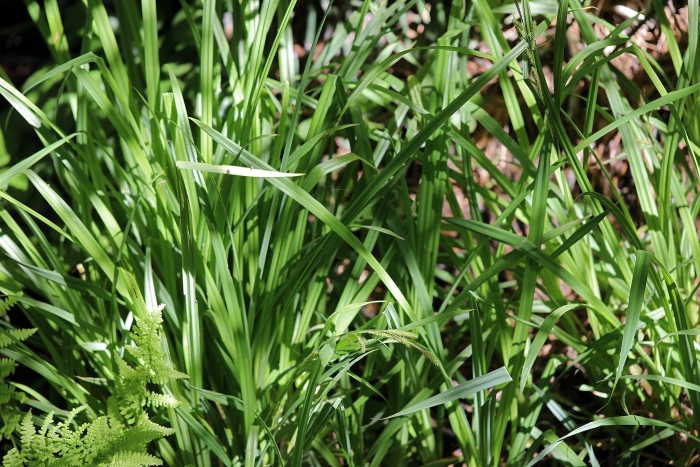Bigleaf Sedge
(Carex amplifolia)
Bigleaf Sedge (Carex amplifolia)
/
/

© Steve Matson
CC BY 4.0
Image By:
© Steve Matson
Recorded By:
Copyright:
CC BY 4.0
Copyright Notice:
Photo by: © Steve Matson | License Type: CC BY 4.0 | License URL: http://creativecommons.org/licenses/by/4.0/ | Uploader: matsonburger | Publisher: iNaturalist |

























Estimated Native Range
Summary
Carex amplifolia, commonly known as Bigleaf Sedge, is a perennial herbaceous plant native to moist meadows, wetlands, and streambanks within coniferous forests across western North America, from British Columbia to Montana and down to California. It typically grows 20-40 inches tall, with a distinctive appearance featuring reddish-tinted stem bases and broad, roughly hairy leaves that can be up to 0.8 inches wide. The inflorescence is notable for its 5-8 cylindrical spikes, each 4-6 inches long, which are densely packed with hundreds of small, wind-pollinated flowers. Bigleaf Sedge has a relatively long flowering season, extending from late spring through early summer.
In cultivation, Bigleaf Sedge is valued for its ability to thrive in wet conditions, making it an excellent choice for rain gardens, water features, and naturalized areas. Its lush foliage and interesting flower spikes add texture to plantings. It prefers full sun to part shade and requires consistently moist to wet soil. While generally low-maintenance, it can spread via rhizomes and may need to be managed to prevent unwanted naturalization. It is not commonly afflicted by serious diseases or pests, but root rot can occur in poorly drained soils.CC BY-SA 4.0
In cultivation, Bigleaf Sedge is valued for its ability to thrive in wet conditions, making it an excellent choice for rain gardens, water features, and naturalized areas. Its lush foliage and interesting flower spikes add texture to plantings. It prefers full sun to part shade and requires consistently moist to wet soil. While generally low-maintenance, it can spread via rhizomes and may need to be managed to prevent unwanted naturalization. It is not commonly afflicted by serious diseases or pests, but root rot can occur in poorly drained soils.CC BY-SA 4.0
Plant Description
- Plant Type: Grass
- Height: 1.5-2.5 feet
- Width: 1.5-2.5 feet
- Growth Rate: Moderate
- Flower Color: N/A
- Flowering Season: Spring, Summer, Fall
- Leaf Retention: Evergreen
Growth Requirements
- Sun: Full Sun, Part Shade
- Water: Medium
- Drainage: Medium
Common Uses
Bird Garden, Border Plant, Butterfly Garden, Deer Resistant, Erosion Control, Low Maintenance, Water Garden
Natural Habitat
Moist meadows, wetlands, and streambanks within coniferous forests across western North America
Other Names
Common Names: Big-Leaved Sedge, Broad-leaved Sedge, Ample-Leaved Sedge
Scientific Names: , Carex amplifolia,
GBIF Accepted Name: